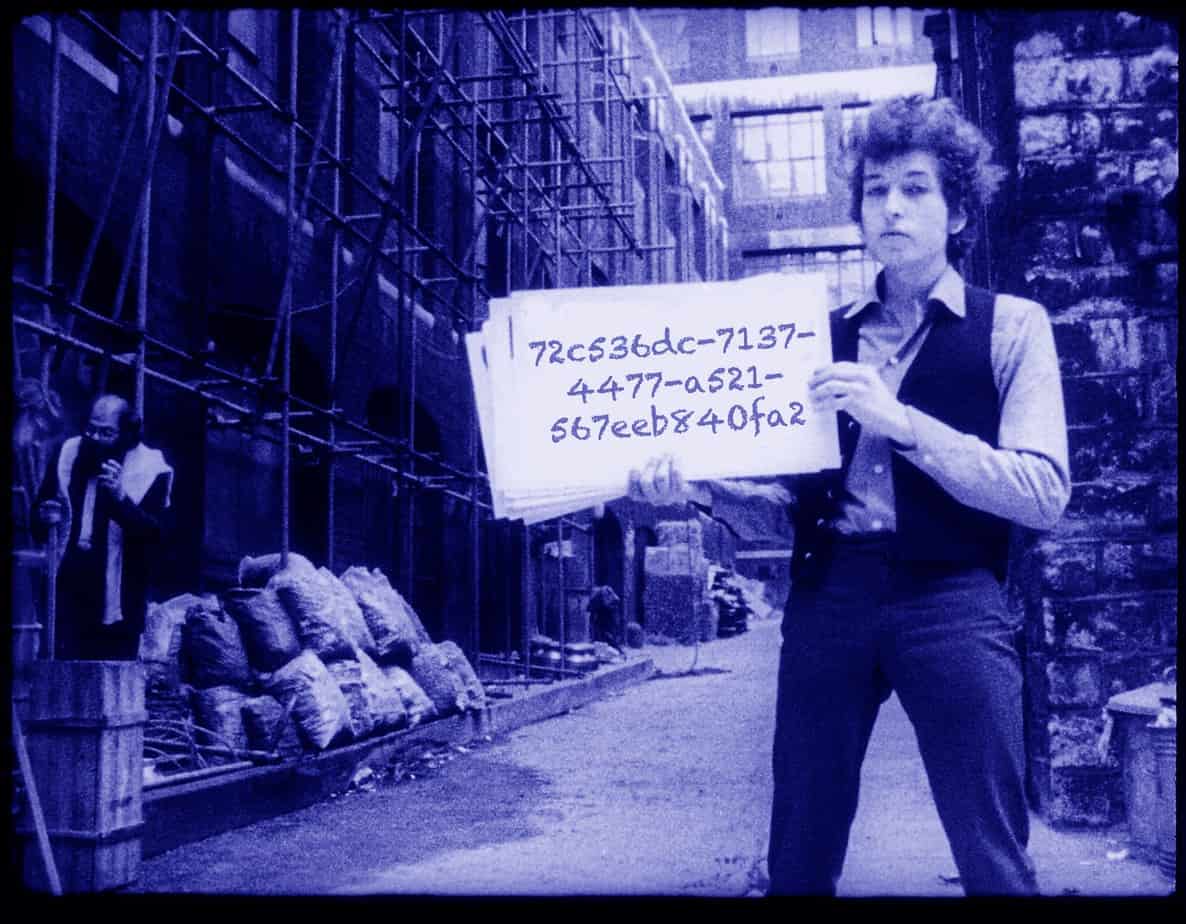by Benji Rogers,
I have spent the better part of the last seven years working with artists, managers, labels and super fans at PledgeMusic, and I’ve had the privilege of exploring the artist-to-fan connection in its many forms. I have looked through this lens from multiple vantage points, from that of the fan, the artist, the label and the publisher, and I’ve also keenly observed the many advances in technology, data, Virtual Reality and the Blockchain.
That said, you don’t need to stand in my shoes to see that the music industry, on the whole is in turmoil and has halved in size financially in the last 15 years even as consumption and demand skyrocket. An industry that has made poor to no use of its most valuable and actionable data. An industry that when faced with a new technology, has historically been more likely to run from than embrace it.
The above is elegantly summed up by one of my favorite quotes from Stan Cornyn: “In the race to adopt new technologies, the music industry historically has finished just ahead of the Amish.” As much as I love the quote, I can’t help but think that’s unfair to the Amish.
No new technology encapsulates for me the potential for positive change for this suffering music industry more than the Blockchain. As such, I want to explore an idea that touches on this game-changing technology in an actionable way that I believe will benefit all in the musical ecosystem.
Minimum Viable Data

The majority of the critical issues cited by music industry experts stem from a few sources, but a key problem area falls within transparency and clarity of ownership data, or metadata to be precise. Metadata in this case is the basic info that is needed to identify who wrote, performed, and owns the music that you listen to every day. This data and its accuracy are a vital means to ensure that creators and owners get paid for their work when their music is used.
Whether it is streamed online, broadcast in a coffee shop, licensed for a TV show, or played on an iPad, this data is the underpinning key or map, if you will, that leads back (in theory) to those who created and/or are invested in that musical work. It sounds like a simple thing to deal with in 2015. Just track all plays, and then pay who is owed for their work. But it’s not that simple.
Songs can have multiple writers, performers, publishers, and licenses, and even different usage rights by territory. A single song can sometimes have to pay out to multiple sets of people in different countries at different times through different organizations. To make matters worse, there is no central database anywhere in the world that tracks ownership. There are, in fact, multiple companies and organizations who keep multiple databases around the globe but much (if not a majority) of the data is often fragmented, incorrect, or out of date — leading to glacially slow payout times and pools of money sitting around with no one to claim it (or no way to claim it once it has been identified).
The situation, as it stands, is a mess. My favorite term for it is “the soup” and there’s a lot of it. It is estimated that the average digital music service makes between 20–40 million songs available to their listeners in a legitimate sense, and this excludes all of the mixes and user-generated content uploaded to the Internet with no data attached to it on a daily basis. In the case of EDM, Dubset estimates that 3.9 million hours of mix content is uploaded each week, each of which contains an average of 30 compositions whose owners are not being compensated. And that’s just EDM!
Let’s imagine a single centralized database of music rights, a database that contained all records of ownership, performance info, copyright ownership and usage rights, and make it open to all who seek to use it. It’s clear from the above that this would be pretty incredible, but also very difficult to build. Broadly speaking here are the main concerns:
- Going backwards into the data soup is difficult and time-consuming
- A lot of people profit from not cleaning up the mess.
- It’s unclear who would actually build it.
- Ownership is also unclear (Who pays for upkeep, data inegrity, etc?)
- It was attempted and it failed.
Fair Trade & Starting From Scratch
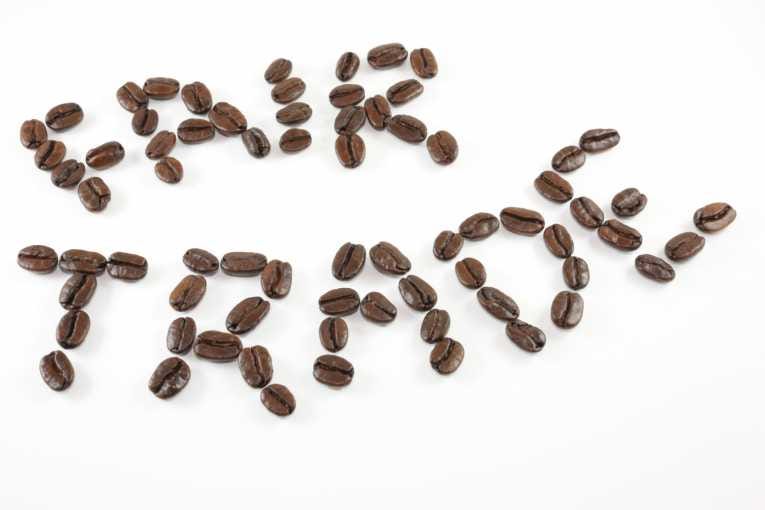
Let’s imagine another scenario: that you could start again from scratch with the creation of a database that would contain the metadata for all of the music already in existence as well as all music going forward. This would be an open, public space in which creators are represented and/or can represent themselves, and in which companies who wished to use this music could simply find what they were looking for. It would also ensure that the creators and owners were being paid for their work as (and when) it is being used.
This would be what I would call a Fair Trade Music Database, one in which any song/entry contained within it would have to have Minimum Viable Data (MVD) attached to each work. Artists and rights holders could then argue that any music outside of this database that did not meet the Minimum Viable Data (MVD) standard would not be Fair Trade, as it would not contain enough rights info within it to constitute a fair use. Again it’s a nice vision, but how do you get through objections 1–5 above?
The Bitcoin Blockchain
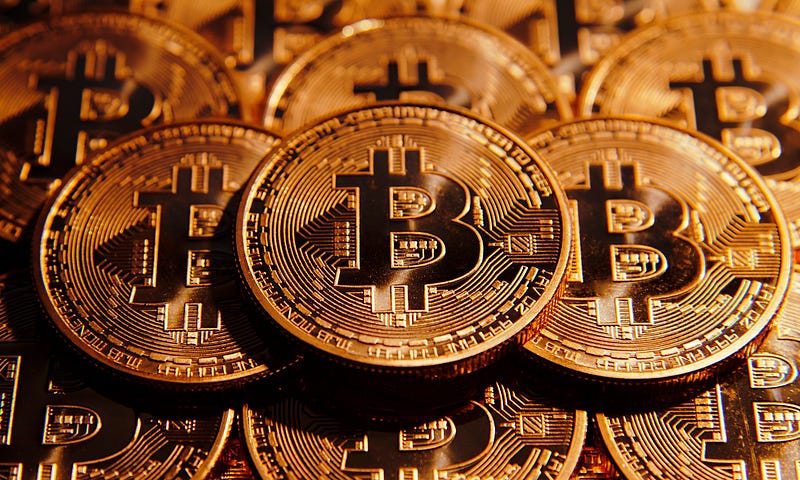
Enter the Bitcoin and its Blockchain. If the above mentioned database were to be created on the Blockchain, it would be decentralized and owned by no single entity (and therefore, everybody). The Blockchain is a massive decentralized ledger containing all transactions from the Genesis Block (e.g. the first block of transactions in the ledger) to the latest block. Blocks are generated every ten minutes and are unchangeable. They are anchored in space and time by the entire network that runs the system, and transactions have a monetary value ascribed to them in Bitcoins (or to be more accurate fractions thereof). Each transaction is unique and identified by a unique address or hash, and every transaction is searchable by anyone should they wish to do so. All in all, it would seem that the Blockchain would be a perfect place to hold this massive Fair Trade Global Database of rights. Open to all. Owned by no one and with a permanent record of ownership stamped in place and time across hundreds of thousands of computers running the system.
To put it simply, if we could put every song’s MVD into a global decentralized database owned by all who interact with it, then this would start to solve a multitude of the music and content industry’s problems regarding ownership, payments and transparency.
Smart Contracts
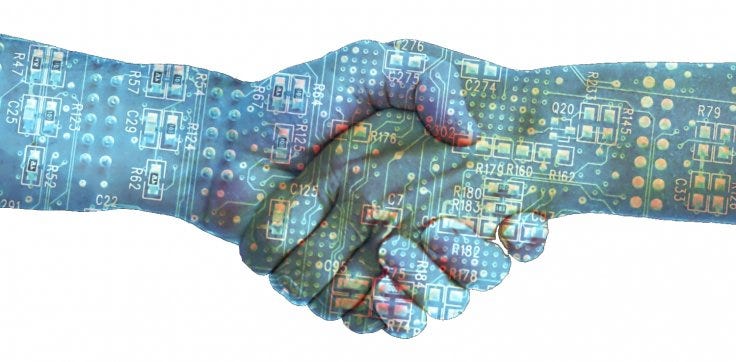
Blockchains also have another incredibly useful feature: the Smart Contract. Since this database is built on a trustless system, this allows for the creation of machine readable or “smart” contracts (like existing APIs) that can interact with the ledger and create and solve outcomes. For example, when a song is played “x” number of times, then “y” is payed to “z”. Or if a song is 25% owned by “a” and 75% owned by “b”, then a payment will be auto-split along this line and paid out once “c” uses have occurred.
If you were to add basic, Smart Contract-readable information to the MVD set, then you could allow third parties to interact with the entire database requiring less third-party slowdown of payments, and proof of work could be done instantaneously. Scenarios in which you could pay for only the amount of the song that you listen to could be created. Or payments in real time at a micro scale could exist (another great feature of Bitcoin).
The Virtual Reality Opportunity
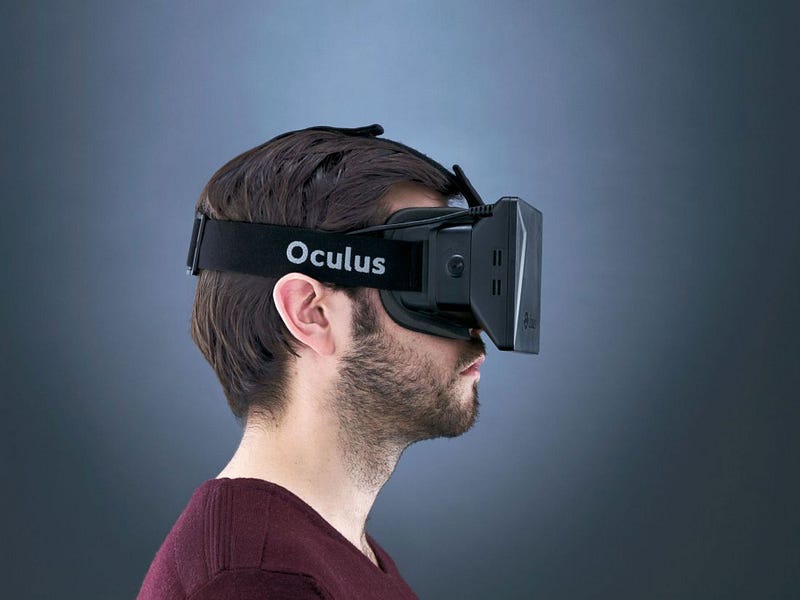
(Existing formats)
- Vinyl
- Tape
- VHS
- CD
- (The Replicable Codec) MP3/WAV/ACC/MOV etc
- DVD
- Vinyl Again?
- Blu-Ray
- Virtual Reality (No standardized format or codec)
In Virtual Reality (VR) and Augmented Reality (AR), I believe that we are about to see the world’s largest deployment of a new format since the CD, DVD or BluRay, and there is as yet no standard or format for this new technology. There is no codec, no “.vr” file standard that all players will adhere, read or write to. They are currently a mashup of other formats — .exe, .wav, .mov, etc — and so there is, at the present time, a singular moment in the cycle of technology to create and adopt a fair trade format and roll it out through VR & AR. There may not be another time in the next 20 or so years to get mass adoption of a new standard, so I propose that one is created.
.bc or “dot BlockChain”. A Non Replicable Codec
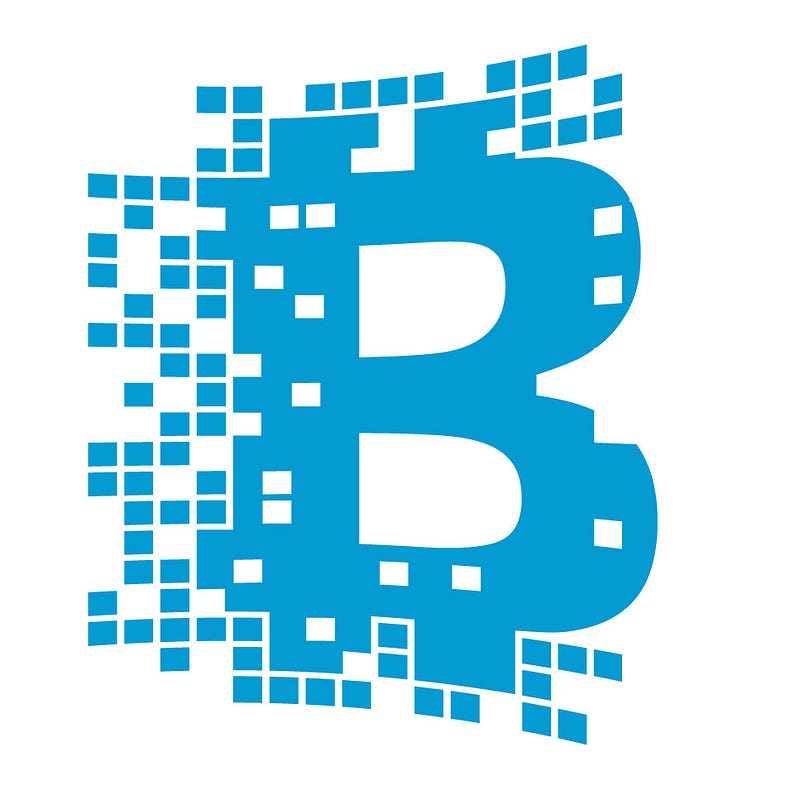
I propose the creation of a new form of codec that I have called .bc (short for “dot BlockChain”). The .bc or “dot Blockchain” codec would be a new standard aimed at VR deployment. Once created, all music and video content encoded into a .bc codec would be required to contain a Fair Trade Minimum Viable Data (MVD) set that is anchored into the Blockchain ledger in order to be comprehensible to a VR player. In other words, a VR player would simply not be able to play any content that did not have a unique Blockchain address or hash attached to it with permissions expressed therein. Furthermore since Blockchain transactions are immutable and unique you cannot replicate any single instance or file and so any content removed from the codec — e.g. ripped from it — would be unreadable to the player as it would no longer contain the aforementioned MVD along with the rights or rules associated with the source file.
Each bc. codec file would contain a play/usage count to make it work in the real world before requiring a re-sync to the Blockchain to assess any changes in usage rights or ownership. To put it another way, when play is attempted by the player, it assesses the # of plays available to it and allows that number. In order to get more plays, you would need to re-access the genesis transaction and either buy or rent more. (Think having to sync Spotify to the web on a phone). These rules for play as part of the Fair Trade Minimum Viable Data would be set at time of encoding by the artist or rights holder. If ownership or rules change, then a new codec is created from the previous with the representative new metadata being “agreed” to through smart contracts by the owners invalidating the older entry but creating a searchable tree of rights changes in the ledger. The closest example I have witnessed to this isMonegraph.
The Trojan Horse
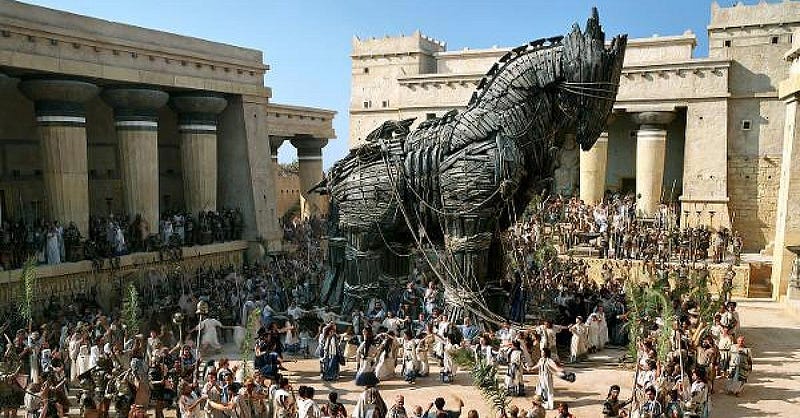
I see VR as the Trojan Horse to seed this new format, as eventually all new and existing content will need to be ported to these new players. New VR content as it is created will need to have both old and new music licensed to what they will broadcast. If the rights holders insist upon the .bc codec with its Fair Trade MVD included, then this actually solves the aforementioned data soup problem. In short, if you want my music for your new VR movie, then you can license it from the codec I supply, or you have to author it into your movie using a .bc codec whose rules I approve.
With this new deployment, we are literally able to start from day zero because each .bc codec authored auto creates a global, decentralized Fair Trade database every time a song is encoded.
Who does this help?
- Artists, Songwriters, Performers, Musicians, Record Labels, Publishers, Managers, PRO’s (Performing Rights Organizations) — Because they can assign and track rights and usage data in real time on a global scale each time a file is accessed, and get paid directly and instantly according to the rules that they author into the MVD and requisite smart contract(s).
- Digital Service Providers, Spotify, Pandora, AppleMusic/iTunes, Netflix, Hulu, etc — Because payments can be accurate, seamless and virtually instant (currently 10 minutes between blocks) with easily accessible data and usage predetermined through smart contracts.
- VR Content Creators — Because they will have access to the majority of new/pre-licensed music and visuals for the new content that they create without having to go through existing painful and slow licensing channels like those that they face today. The codec that they would work with contains within it all of the rights available. Where this is not the case, they can author it in for the rights holder to make payment easier or request an authored .bc codec for broadcast.
- VR Platforms & Hardware makers — Because they can have a single unified cross-platform standard to allow for seamless ingestion and tracking of content through their networks and systems. This results in fewer takedown notices for illegal use and fewer fans seeing notices like “due to rights holder restrictions this content cannot be played.” In theory, only “jailbroken” players would be able to play unauthorized content.
- The Public — Because where allowed, they can pay for only what they want to hear or see when they want to. They can know that creators, large or small, will be compensated fairly and that no one is losing in the value chain. More content will be made available faster as it will not need to go through multiple slowdown bottlenecks due to distribution challenges around rights.
- The Blockchain & Bitcoin — Because the ledger would become a mainstream application with immediate real world usage beyond just the transacting of money. The ledger would become a powerful record of ownership for all. Its value would only increase with the more actionable data that it holds.
Who does this hurt?
Those who profit from a lack of transparency, piracy or the slowing down of payments to rights holders.
How hard is this?
What I have outlined above is pretty hard to pull off. It requires a lot of people to get on the same page and the acceptance of some principles that are considered anathema to those who profit from the obfuscation and confusion around payments, transparency and inaccurate data. On the tech side, however, it’s not as hard as it sounds.
I’ll save the technical caveats for the notes below, but pretty much all that I have outlined already exists and is being used by millions of people every day. It has just never been attuned to this purpose. This is why I believe that it is beholden to the rights holders and the music industry as a whole to demand this — to demand that their work is fairly traded. Like the Fair Trade movement in coffee, food and clothing which enjoys massive global success, I believe that consumers, if offered the choice, would take it. At present, artists do not have a choice. Pioneers like Imogen Heap, whose recent experimentwith Ujo’s platform points to what is going to be possible, are leading the way and it is amazing to watch as it unfolds. However, I believe that if the music community is going to get this right, then it will need to be through a format and codec that cannot be separated from its rights.
If we don’t start now and VR goes out in multiple formats to platforms that will, in all likelihood, quickly scale, it gets that much harder to retrofit the above into a unified standard. Not doing this now will just multiply the soup with what will be tens of millions of new songs being pushed out into an already broken system.
Who would do it?
When I had this idea, my immediate thought was to patent and create this technology as a private company that would profit from it. I had a good friend and visionary lawyer Allen Bargfrede file a provisional patent for the idea. But after chatting to my wife (the smartest person I know) and some good friends, I believe that this needs the community to get behind it. It needs the same power that created the Blockchain to turn its attention to this. The private route would be too slow and would also create a single point of failure if the company didn’t get it off the ground quickly enough, ran out of money or just created a bad product.
So with this piece, I am seeking to put it out there for whoever wants to make it. It’s my hope that we see a .bc codec become a standard before it’s too late. If I were a multimillionaire and had more spare time, I’d put up the money to make this happen in a heartbeat. If either of those facts change, then I will stand by my promise. But for now, I would ask that you share this with anyone that you think would get value from it and/or would be able to code it. Simply making more of what we have today only worsens a situation that desperately needs to be addressed.
We need to create a Fair Trade Music Format whose codec auto creates a global decentralized database of rights every time a song is encoded. #dotblockchain
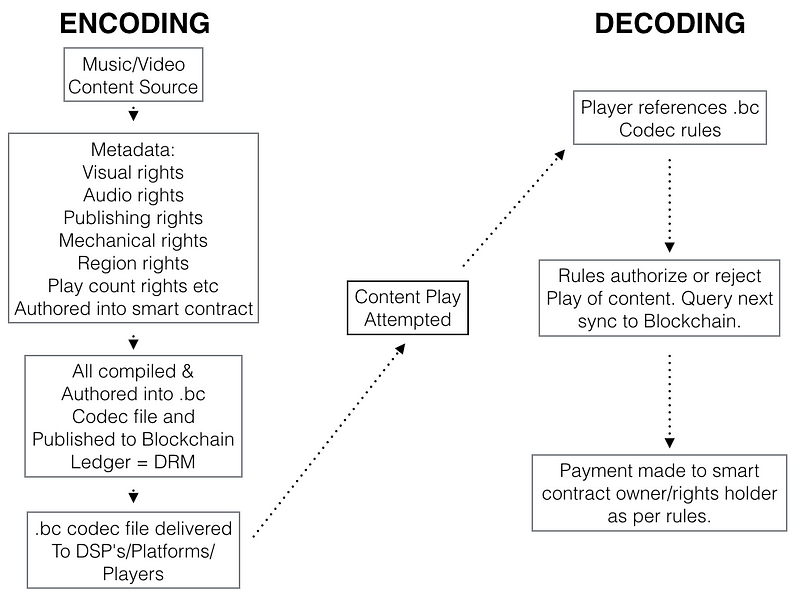
Notes
- For the purposes of this piece, I have focused on the Bitcoin Blockchain as it is the the largest and most widely used. It does however have technical constraints at this time and other platforms and Blockchain solutions (Etherium, Muse, Rootstock etc) may be better for the use case outlined. That or the codec could express its data into any number of blockchains. The key is to adhere to the Fair Trade standard of binding the content to the data.
- To mitigate duplication, fraudulent entries, or illegally authored song data I propose that all newly authored files pass through either a Shazam orDubset MixScan technology to search for prior or altered ownership.
- File size is still a difficult issue in the Bitcoin Blockchain community, and this could be a problem as the data set grows. Ideally the entire codec would sit in the Blockchain alongside its data, but this would mean a massive database that is probably not viable at the moment. This could be solved by potentially using fingerprinted and compressed low-res versions of the song in the transaction itself, or by using so-called side chains or a decentralized storage system for the core files. Think the Library of Congress but for recorded musical works. Players, of course, would not need to hold the entire blockchain to play the file requested at that time but would only need that part of the blockchain to reference the set of rules needed in the moment. In any event, size issues and speed of search remain problems to be solved.
- MVD is just the beginning. Ideally we should shoot for a MXVD (Maximum Viable Data) set to allow for thousands of different types of use cases and micro-licences of all kinds. Think types of uses segmenting by genre or lyrical subject matter. Further to this bids could be accepted or rejected through an MVD interface for content specific uses like audio stems, micro licenses by instrument & derivative work payment paths by track etc.
- It is suggested that multiple signatures be required to change any ownership rights in perpetuity through smart contracts as part of the MVD.
- Thank you Vickie Nauman for the Artwork!
Please click here for part II.


